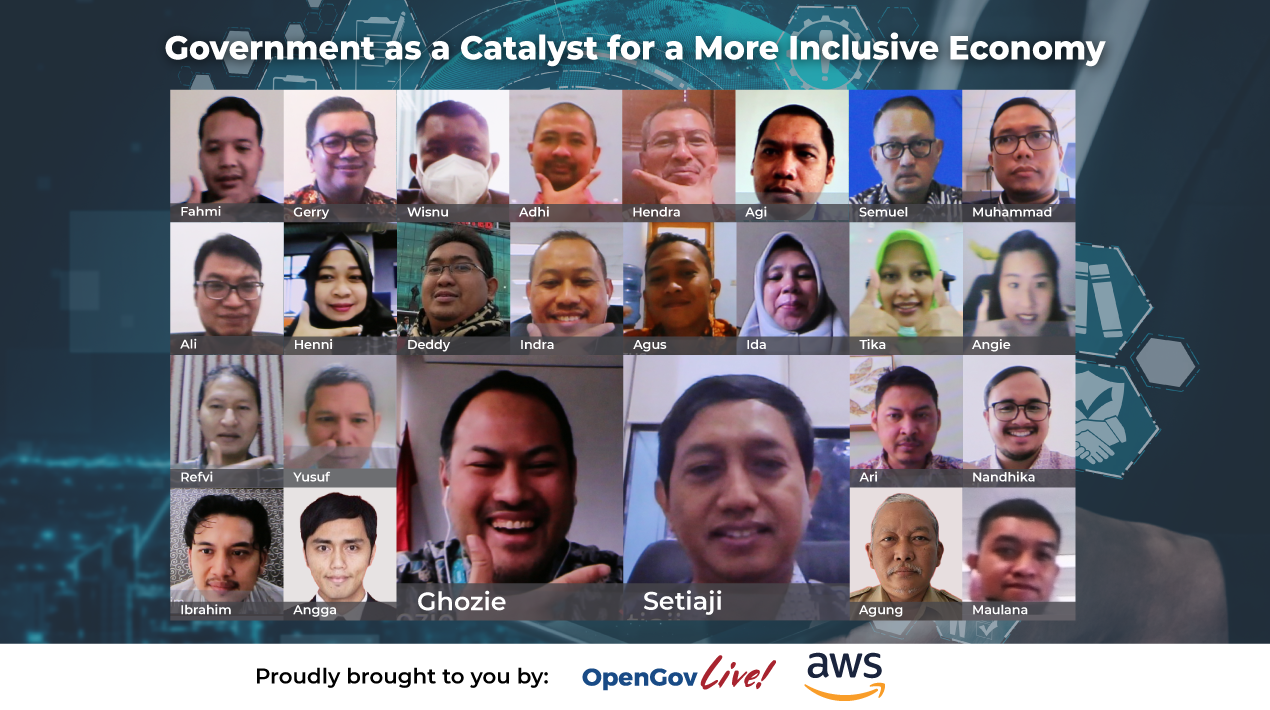
With the aid of the Making Indonesia 4.0 roadmap, the nation has an excellent framework around which to build the transformation of its manufacturing sector into a global leader in the Fourth Industrial Revolution (4IR).
Despite pressure from the COVID-19 pandemic, the manufacturing sector continued to thrive and significantly contributed to Indonesia’s economic expansion.
In addition, the Artificial Intelligence, the Internet of Things, augmented and virtual reality, 3-D printing and next-generation robots, the 4IR can assist Indonesia in reversing this trend.
Utilising such technology can enable enterprises to bolster staff efficiency, ramp up production and increase output. Digital transformation revitalises the entire industry, creates a plethora of employment possibilities and allows it to reclaim its position as a leader in exports.
However, there are limitations on what enterprises, especially smaller organisations, can achieve independently. In recognition of this, the Indonesian government has pledged to assist in transforming the nation’s industrial industry across the board, emphasising SMEs.
By collaborating with the government to implement the 4IR road map and related initiatives, industries will have direct access to additional investments in technology and R&D. Further up the value chain manufacturers will be able to modify their operations, increase their efficiency and competitiveness and even explore new business models.
The benefits of cloud technology to Indonesia’s public sector were the focus of the OpenGovLive! Virtual Breakfast Insight on 26 August 2022 with the vital digital leaders and decision-makers in the Indonesian public sector.
Accelerating Indonesia’s National Digital Transformation

Kicking off the session, Mohit Sagar, CEO & Editor-in-Chief, acknowledges that the COVID-19 pandemic forced game-changing innovation as it presented an ultimatum for the world. It shows that solid governance solutions to preserve a specific purpose or function in the face of ongoing disruptions that are sufficiently adaptive, pragmatic and agile are required for turbulent challenges.
Indonesia’s cultural richness and diversity draw tourists from various countries, making it one of the rising countries in the region. “This huge archipelago comprises more than 300 ethnic groups dispersed over its 17,500 islands, resulting in microcultures within the country.”
Further, the rapid growth of Indonesia’s digitalisation efforts, which has directly benefited unicorns as their firms operate in digitally adapted industries like finance, e-commerce, and logistics is one of the causes that has nurtured and catalysed the blooming of the nation’s digital economy.
Much of this has been because of the serious challenges the pandemic presented which drove many businesses and customers to transition online and rely on digital platforms to survive. Indonesia has experienced great success with its AI and AI-enabled eCommerce businesses, even as the nation’s awareness of using AI in numerous industries is still developing.
Mohit believes that data is one of the most valuable resources of an organisation since it establishes the distinctiveness of any association. It is a precious resource that firms can use to strengthen ties with stakeholders, raise income and enhance operations.
The pandemic has shown the world that the safety of a nation’s population and a secure, tech-enabled business environment is key to its survival and development, and Indonesia is no different.
Any agency or organisation could quickly implement technology-enabled change. However, with the right technology and the appropriate partner, it can sharpen its digital transformation, guiding its strategy in the correct direction, making an impact that lasts and discovering new opportunities for competitive advantage.
Cloud technology is one such innovation that could help the government reach its goals of diversifying industries, making the economy more open to everyone and spreading wealth more equitably among Indonesians.
It ensures that the government’s systems can adapt to different workloads in varying contexts. Cloud technology makes it easy to scale up or down without spending a lot of money on capital and not be dependent on traditional resource-intensive models. This, in turn, allows the public sector to meet people’s needs in any situation. The agility and scalability it offers are vital in these VUCA times.
Moreover, cloud technology makes it easier for citizens to interact with their government, offering the public sector the ability to better meet their needs.
The government must prepare a path for a more seamless digital transformation by creating the necessary infrastructure. When combined with the right infrastructure, cloud technology makes sure that even people on Indonesia’s far-flung islands can use government services.
In addition, the public’s ability to use technology is essential for its future. After learning the fundamentals of accessing internet resources, users have access to various additional online training to further hone the abilities that will help them compete on a global scale.
As a result of Indonesians embracing and implementing new technological applications, countless opportunities continue to emerge.
Mohit emphasised that the digital partnership is attractive because it can give a company access to expert knowledge or skills, open the door to a new customer market, or allow for a more flexible approach. “Basically, it lets the organisation focus on the main business while letting someone else handle the growth of the business.”
Accelerating Government Digital Transformation

Mohammad Dalel, Country Manager, Indonesia, Worldwide Public Sector, Amazon Web Services, shared that cloud computing facilitates internet-based access to servers, storage, databases and various application services.
Cloud computing is the on-demand delivery of computing power, databases, storage, applications and other IT resources via an internet-based cloud services platform with pay-per-use pricing.
“A cloud services platform like Amazon Web Services owns and maintains the hardware connected to the network that is needed for these application services. You can then use a web application to set up and use what you need,” explains Mohammad.
Amazon Web Services (AWS), started in 2002 when they offered a Web Services interface for the Amazon.com product catalogue. Not long after that, in 2003, Amazon’s leadership had to determine what its core strength and direction were.
“It’s becoming clear that over years of developing and operating the Amazon.com platform, we have developed our core competencies in operating massive-scale technologies and data centres,” Mohammad recalls.
After that, they released Simple Storage Service (S3), Elastic Compute Cloud (EC2) and Simple Queue Service (SQS) and in 2006, they publicly announced AWS.
They currently serve more than a million active clients and offer more than 1,000 new services annually. This considerable success evolved because of their customer input.
“We take user input very seriously, and it served as the foundation for creating and enhancing AWS services. So as a business, we put the needs of the consumer first. After hearing what the customer says, we work backwards,” says Mohammad.
Furthermore, in each region, the AWS cloud infrastructure has multiple Availability Zones (AZ), and each AZ has multiple, physically separated data centres – without other backbone providers. Each region also has two independent, fully redundant transit centres, which allow traffic to cross the AWS network and connect regions to the global network.
In the traditional model, a company would pay for everything and there are significant long-term contracts and undergo a lengthy planning process, thus, there is a lot of internal administration and approvals. This is contrary to cloud computing.
He clarifies that with cloud computing, the organisation may focus on producing apps and services to satisfy its goal of meeting customers’ demands. “Give your developers the tools they need to manage your IT and achieve your goal. Start small and scale based on consumer demand.”
A cloud services platform enables instant access to flexible and low-cost IT resources, whether running applications that share photographs with millions of mobile users or managing the organisation’s key operations.
With cloud computing, the enterprise does not have to make substantial upfront investments in hardware or spend much time monitoring. Instead, it can precisely provide the computing resources needed to fuel its most recent brilliant idea or to run its IT department.
The organisation has access to as many resources as required, practically immediately, and has to only pay for what it uses. Over 200 AWS services are available, ranging from data warehousing to deployment tools, and directories to content delivery. New services can be provisioned quickly and without incurring any upfront fixed costs.
This enables enterprises, start-ups, small and medium-sized businesses and public-sector customers to access the building blocks they require to respond quickly to changing business requirements.
Mohammad points out, “You can scale as needed for the business, move faster quickly, be more agile, and give the infrastructure to the organisation’s builders. With cloud computing, you are allowing the real engineers to construct on your behalf, which is powerful!”
Fireside Chat: Digital Technologies’ Role in Increasing Government Service Accountability and Efficiency

“Everything changed after the COVID-19 crisis when both provincial and private sector start-ups immediately began looking for ways to improve service delivery,” says Setiaji, Chief of Digital Transformation Office, Ministry of Health, Republic of Indonesia.
Indonesia has one of the fastest-growing digital economies in the world. However, it is crucial to ensure that even the most marginalised people may easily access digitalised public services, such as those offered by the Ministry of Health.
Some of the problems that plague health care systems have been eased thanks to implementing health-tech solutions including teleconsultations and surveillance measures. The public could better access verified medical advice, receive updates on the coronavirus situation, communicate with their doctors remotely and even have medication prescribed and delivered using digital tools.
“The public has access to telemedicine, and we send medications to their homes, eliminating the need for them to visit hospitals,” says Setiaji. “The Ministry of Health had released its first digital health roadmap, laying the basis for digitalising the country’s health services to increase health care coverage for all inhabitants.”
Setiaji emphasised the advantage of the “SATUSEHAT” or “ONE HEALTH” Indonesia Health Services platform, which was recently unveiled in Jakarta as a realisation of the country’s health technology transformation pillar.
This aims to support the Indonesian health systems, such as primary services transformation, referral services transformation, health resilience systems transformation, health financing systems transformation and human resource transformation in the health sector. The ministry aims to integrate the platform into 8,000 health facilities across the country by the end of this year.
Furthermore, health-tech providers have been able to provide more locale-based solutions, tailored to the needs of residents in different provinces, thanks to cloud technology, which operates on a pay-as-you-go model in which companies are charged based on usage.
Setiaji added that when the pandemic struck, people realised that some of these technological tools and applications could help them. Better public service delivery is in high demand.
Technology has become an enabler in Indonesia’s response to the crisis. They have been using PeduliLindungi which means “care to protect,” a COVID-19 tracking app that the government uses to improve health surveillance.
There is also a health tech platform that is very popular and runs on the cloud called Halodoc, where citizens can connect to more than 20,000 doctors online. Halodoc has become a place where all services related to the pandemic can be found in one place. Then there are the many platforms and apps that make food and package deliveries easier during lockdowns.
All these digital tools have been highly beneficial to Indonesia and these innovations, which enable better service delivery for citizens, would be challenging to implement if cloud technology was not used.
Government organisations can access vast amounts of data necessary for their daily operations thanks to big data platforms.
“We also have access to information from other governmental organisations, like the education and housing authorities,” says Setiaji. “The information assisted the health ministry in evaluating the health of residents and students considering the epidemic.”
Closing Remarks
Mohammad is firmly convinced that the cloud provides greater flexibility to businesses. “Our clients have access to a variety of best practices guide, encryption tools, and other forms of assistance that they can utilise to implement application-level security measures.”
AWS partners also offer customers hundreds of tools and features to help them meet their security goals. These tools and features include network security, configuration management, access control, and data encryption.
“We look after the security of the cloud, and customers look after your security in the cloud,” claims Mohammad.
Moreover, the strategy for modernisation projects where the advantages of cloud, among other things, can offer any given application a clear path to improved customer experience. The fundamental architecture is also crucial to the success of application modernisation.
Mohit agrees that innovation is a characteristic shared by organisations that truly distinguish out from the competition. An organisation cannot expect to maintain a competitive edge, regardless of its industry, if innovation is not incorporated into the overall business plan.
In addition, a deep dive into cloud solutions is a great place to start if the company wants more flexibility, a better customer experience and a better way to use organisational knowledge.
“The path of innovation not only improves the abilities of your workforce but also the scalability of your operations. Hence, your team’s ability level will increase as you adopt the cloud,” says Mohit.
















